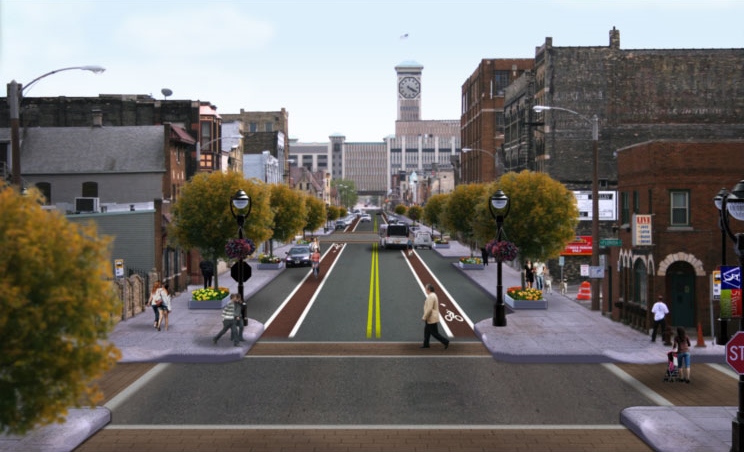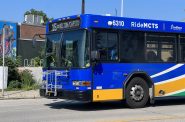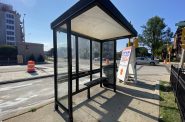Committee Okays Complete Streets Policy
Proposal on street design places pedestrians and cyclists on same level as motorists

This rendering of S. 2nd Street includes a variety of features of a “Complete Street.” Many, such as wider sidewalks, street trees and bike lanes, were incorporated in the streets’ reconstruction in 2010. Rendering by Kieran Sweeney.
A new city policy is intended to make streets substantially safer for more than just drivers of motor vehicles.
A proposal to adopt a Complete Streets policy had its first hearing Wednesday morning before the Common Council’s Public Works Committee.
According to the proposed ordinance: “Complete Streets are defined as facilities that are safe, comfortable and convenient for users of all travel modes, including walking, use of mobility aids, bicycling, riding public transportation, and driving motor vehicles.”
“We are really pulling the resources together throughout the city that when we look at designing streets… we account for the most vulnerable users,” said Department of Public Works coordination manager Karen Dettmer. The ordinance establishes a broad committee of city stakeholders to review street reconstruction or repaving projects. While many streets would receive curb bump outs, wider sidewalks, painted or protected bike lanes or other traffic calming measures, “some streets will look very much like they do today,” said Dettmer.
The committee unanimously supported the proposal, and committee chair, Alderman Robert Bauman, predicted the full council would vote unanimously to adopt the policy.
“So the viewing public knows, most of the major road projects are state projects,” said Bauman, citing projects like the ongoing repaving of Wells Street and reconstruction of W. Wisconsin Ave. The state rescinded a very prescriptive Complete Streets policy in 2015 under a budget proposal by Governor Scott Walker.
City Engineer Jeff Polenske responded: “what we’ve heard from the [Wisconsin Department of Transportation], with or without their own policy, if the city has a policy that is something we can apply to our projects.”
Ald. Michael Murphy expressed concern about DPW design engineers. The attitude of some, he suggested, is “I have a traffic manual handbook that was printed by God. I have to follow that handbook because it’s what’s in the handbook.”
Bauman echoed such concerns: “For the 15 years I’ve been on the council I’ve always been pushing this stuff and there has always been pushback. “I certainly support this (Complete Streets policy) and hopefully it has some impact.”
Polenske attempted to assuage their concerns: “We’ve started to make some changes within our department. We have implemented a multi-modal unit… Part of this is to really start initiating a training effort so that there is a really a baseline of what this policy means.”
Ald. Nik Kovac warned that the fight over safer streets isn’t over. “Sometimes we’re going to have to make a tough decision where we’re going to have to lose some productivity or travel time. That’s a fight we should be prepared to win,” said the Riverwest and East Side alderman.
Kovac noted that some changes, including the recent addition of protected bicycle lanes over two bridges, were wins for everyone involved, while others will negatively impact the ability of motorists to speed.
A number of prominent cycling and pedestrian advocates were in attendance in support of the proposal. Joining leading proponents Jessica Wineberg and Caressa Givens, both of whom work for the Wisconsin Bike Federation, were Tour of America’s Dairyland director Bill Koch, Bublr Bikes board member and cycling advocate Tonieh Welland, ZIP MKE founder Dominic Inouye, UW-Milwaukee professor Robert Schneider, attorney Dennis Grzezinski, the Harbor District‘s Tony Giron and Alverno professor Joyce Tang Boyland. The advocates submitted a petition with 740 signatures supporting the policy.
If you think stories like this are important, become a member of Urban Milwaukee and help support real independent journalism. Plus you get some cool added benefits, all detailed here.
Political Contributions Tracker
Displaying political contributions between people mentioned in this story. Learn more.
- May 8, 2019 - Nik Kovac received $50 from Dennis Grzezinski
- May 20, 2016 - Robert Bauman received $25 from Dennis Grzezinski
- February 11, 2016 - Nik Kovac received $25 from Dennis Grzezinski
- February 11, 2016 - Nik Kovac received $50 from Jeff Polenske
- April 9, 2015 - Nik Kovac received $50 from Dennis Grzezinski
City Hall
-
Attempt To Expand Disorderly Conduct Fine, Ban Bump Stocks Before RNC Fails
 Jul 11th, 2024 by Jeramey Jannene
Jul 11th, 2024 by Jeramey Jannene
-
Despite Losing Lawsuit, Coalition To March on RNC Will Proceed Without Permit
 Jul 9th, 2024 by Graham Kilmer
Jul 9th, 2024 by Graham Kilmer
-
Council Wants State to Ban Bump Stocks
 Jul 4th, 2024 by Jeramey Jannene
Jul 4th, 2024 by Jeramey Jannene
Transportation
-
MCTS Adds 28 New Buses
 Jul 13th, 2024 by Graham Kilmer
Jul 13th, 2024 by Graham Kilmer
-
MCTS Designing New Bus Shelters
 Jul 10th, 2024 by Graham Kilmer
Jul 10th, 2024 by Graham Kilmer
-
MCTS Updates RNC Bus Detours To Better Serve Downtown, Riders
 Jul 9th, 2024 by Jeramey Jannene
Jul 9th, 2024 by Jeramey Jannene






















The Fire Department should also be a part of the discussion.
The picture shows a bus blocking a bike lane. This is bad design. One solution is to place the bike lane between the bus stop and the sidewalk (but left of the parking lane elsewhere). See an example here:
https://nacto.org/publication/transit-street-design-guide/transit-streets/two-way-streets/neighborhood-transit-street-bike-lane/